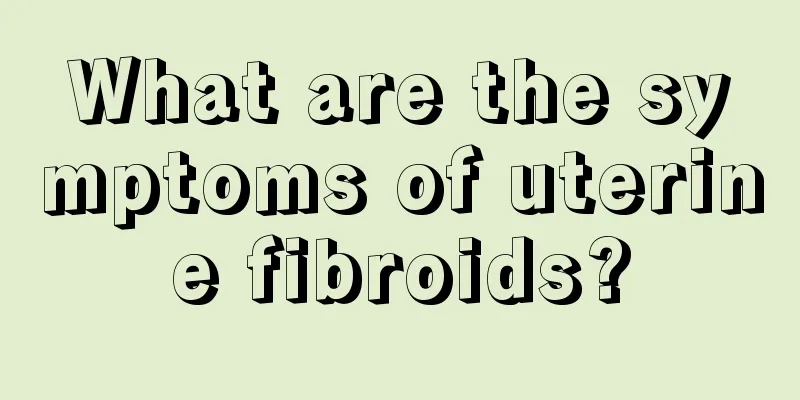What are the symptoms of uterine fibroids?

|
We all know that uterine fibroids are a relatively serious gynecological disease for women. In the early stage of clinical manifestations, women will feel severe abdominal pain during menstruation, and in the late stage, the tumor in the uterus will become larger and larger. At this time, women have to take hysterectomy. After the uterus is removed, they can no longer get pregnant. So, what are the symptoms of uterine fibroids? Uterine leiomyoma, also known as uterine fibroids, is the most common benign tumor of the female reproductive organs. It is common in women aged 30 to 50 and rare in women under 20 years old. According to statistics, at least 20% of women of childbearing age suffer from uterine fibroids. Because most uterine fibroids have no or few clinical symptoms, the reported clinical incidence rate is much lower than the actual incidence rate of fibroids. Since uterine fibroids are mainly formed by the proliferation of uterine smooth muscle cells, with a small amount of fibrous connective tissue as a supporting tissue, it is more accurate to call them uterine leiomyomas, or uterine fibroids for short.To date, the cause and pathogenesis of uterine fibroids are still unclear and may be related to the following aspects. There are many risk factors that contribute to the development or growth of uterine fibroids. Factors that increase the risk of uterine fibroids include: maternal use of estrogen during pregnancy, young age at menarche, nulliparity, late childbearing, obesity, African Americans, and tamoxifen. Factors that reduce the risk of uterine fibroids include exercise, multiple births, menopause, and oral contraceptives.
Modern medicine believes that uterine fibroids are hormone-dependent tumors. Uterine fibroids are common during the childbearing years, are rare before puberty, and shrink or disappear after menopause. Studies have shown that estrogen and progesterone synergistically promote the growth of fibroids. The main mechanism may be that estrogen in the follicular phase upregulates estrogen and progesterone receptors on uterine smooth muscle, and then progesterone promotes the mitotic activity of fibroids in the luteal phase, thereby stimulating the growth of fibroids. Genetic factors Cytogenetic studies have shown that 25% to 50% of uterine fibroids have cytogenetic abnormalities, including exchange of chromosome 12 and chromosome 17 fragments, rearrangement of chromosome 12, and partial deletion of chromosome 7.
There are increased expression levels of multiple growth factors and their receptors in uterine fibroids, which are considered to be mediators or effectors of the upregulation of ovarian sex hormones during uterine fibroid formation. However, the possibility of abnormal primary regulation of one or more growth factors cannot be ruled out. Uterine fibroids usually contain excessive extracellular media, which mainly contain fibroblasts and the collagen types I and III they produce. Myoma cells interact with fibroblasts and various growth factors, providing a suitable microenvironment for the formation and growth of myomas. Current molecular biology research suggests that uterine fibroids are formed by the proliferation of monoclonal smooth muscle cells, and multiple uterine fibroids are formed by different cloned cells. |
<<: How to treat uterine prolapse
>>: What are the symptoms of high uric acid in women?
Recommend
【Health Science】A small comb can help you stay healthy
[ Secret ] The hidden health secrets of combs Rep...
How long does it take for mifepristone to work?
I believe everyone has some knowledge about miffy...
Can't see the blackboard clearly in the new semester? Don't let the "back to school season" become your child's "myopia season"!
During the holidays, children are addicted to mob...
How to make dried shrimp vermicelli casserole? How to store dried shrimp
The best quality shrimps are light yellow, light ...
Symptoms of urinary tract infection in women
What issues should women pay attention to during ...
Olympic champion Zheng Qinwen insists on eating chicken breast and broccoli for 360 days. Can ordinary people do the same?
Review expert: Peng Guoqiu, deputy chief physicia...
What element does spinach contain the most? Does spinach supplement iron?
Spinach is rich in a lot of minerals, vitamins an...
What is the cause of vaginal discharge that is like tofu dregs?
Everyone knows that female friends will suffer fr...
Private parts darken after childbirth
The main reason why women's private parts bec...
What are the treatments for endometriosis?
Gynecological diseases often have a great impact ...
What is the hardness inside the breast?
Many women have breast problems due to excessive ...
Is Chinese medicine effective for cervical adhesion?
There are several reasons for cervical adhesion i...
What to do if your menstrual flow is light after miscarriage
Because of various reasons, many people have to c...
Why does the amount of vaginal discharge increase and become like water?
Leucorrhea is a secretion from the female vagina....
Viscous fluid discharged after 5 days of medical abortion
Medical abortion is a very common method of termi...


![[Doctors talk about medicine] Preventing the recurrence of otolithiasis: scientific lifestyle and regular check-ups](/upload/images/67f17973b0c68.webp)






